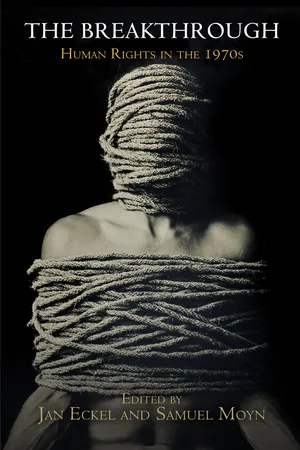
- 352 pages
- English
- ePUB (mobile friendly)
- Available on iOS & Android
About This Book
Between the 1960s and the 1980s, the human rights movement achieved unprecedented global prominence. Amnesty International attained striking visibility with its Campaign Against Torture; Soviet dissidents attracted a worldwide audience for their heroism in facing down a totalitarian state; the Helsinki Accords were signed, incorporating a "third basket" of human rights principles; and the Carter administration formally gave the United States a human rights policy. The Breakthrough is the first collection to examine this decisive era as a whole, tracing key developments in both Western and non-Western engagement with human rights and placing new emphasis on the role of human rights in the international history of the past century. Bringing together original essays from some of the field's leading scholars, this volume not only explores the transnational histories of international and nongovernmental human rights organizations but also analyzes the complex interplay between gender, sociology, and ideology in the making of human rights politics at the local level. Detailed case studies illuminate how a number of local movements—from the 1975 World Congress of Women in East Berlin, to antiapartheid activism in Britain, to protests in Latin America—affected international human rights discourse in the era as well as the ways these moments continue to influence current understanding of human rights history and advocacy. The global south—an area not usually treated as a scene of human rights politics—is also spotlighted in groundbreaking chapters on Biafran, South American, and Indonesian developments. In recovering the remarkable presence of global human rights talk and practice in the 1970s, The Breakthrough brings this pivotal decade to the forefront of contemporary scholarly debate. Contributors: Carl J. Bon Tempo, Gunter Dehnert, Celia Donert, Lasse Heerten, Patrick William Kelly, Benjamin Nathans, Ned Richardson-Little, Daniel Sargent, Brad Simpson, Lynsay Skiba, Simon Stevens.
Frequently asked questions
Information
Table of contents
- Cover
- Half title
- Title
- Copyright
- Contents
- 1. The Return of the Prodigal: The 1970s as a Turning Point in Human Rights History
- 2. The Dystopia of Postcolonial Catastrophe: Self-Determination, the Biafran War of Secession, and the 1970s Human Rights Moment
- 3. The Disenchantment of Socialism: Soviet Dissidents, Human Rights, and the New Global Morality
- 4. Dictatorship and Dissent: Human Rights in East Germany in the 1970s
- 5. Whose Utopia? Gender, Ideology, and Human Rights at the 1975 World Congress of Women in East Berlin
- 6. “Magic Words”: The Advent of Transnational Human Rights Activism in Latin America’s Southern Cone in the Long 1970s
- 7. Shifting Sites of Argentine Advocacy and the Shape of 1970s Human Rights Debates
- 8. Oasis in the Desert? America’s Human Rights Rediscovery
- 9. Human Rights and the U.S. Republican Party in the Late 1970s
- 10. The Polish Opposition, the Crisis of the Gierek Era, and the Helsinki Process
- 11. “Human Rights Are Like Coca-Cola”: Contested Human Rights Discourses in Suharto’s Indonesia, 1968–1980
- 12. Why South Africa? The Politics of Anti-Apartheid Activism in Britain in the Long 1970s
- 13. The Rebirth of Politics from the Spirit of Morality: Explaining the Human Rights Revolution of the 1970s
- Notes
- List of Contributors
- Index
- Acknowledgments